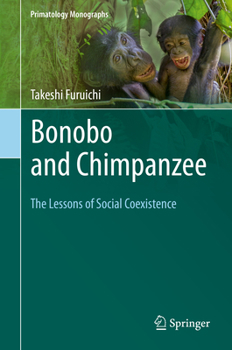Bonobo and Chimpanzee: The Lessons of Social Coexistence
This book describes the similarities and differences between two species, bonobos and chimpanzees, based on the three decades the author has spent studying them in the wild, and shows how the contrasting nature of these two species is also reflected in human nature.
The most important differences between bonobos and chimpanzees, our closest relatives, are the social mechanisms of coexistence in group life. Chimpanzees are known as a fairly despotic species in which the males exclusively dominate over the females, and maintain a rigid hierarchy. Chimpanzees have developed social intelligence to survive severe competition among males: by upholding the hierarchy of dominance, they can usually preserve peaceful relations among group members. In contrast, female bonobos have the same or even a higher social status than males. By evolving pseudo-estrus during their non-reproductive period, females have succeeded in moderating inter-male sexual competition, and in initiating mateselection. Although they are non-related in male-philopatric society, they usually aggregate in a group, enjoy priority access to food, determine which male is the alpha male, and generally maintain much more peaceful social relations compared to chimpanzees.Lastly, by identifying key mechanisms of social coexistence in these two species, the author also seeks to find solutions or "hope" for the peaceful coexistence of human beings.
"Takeshi Furuichi is one of very few scientists in the world familiar with both chimpanzees and bonobos. In lively prose, reflecting personal experience with apes in the rain forest, he compares our two closest relatives and explains the striking differences between the male- dominated and territorial chimpanzees and the female-centered gentle bonobos."
Frans de Waal, author of Mama's Last Hug - Animal Emotions and What They Tell Us about Ourselves (Norton, 2019)





